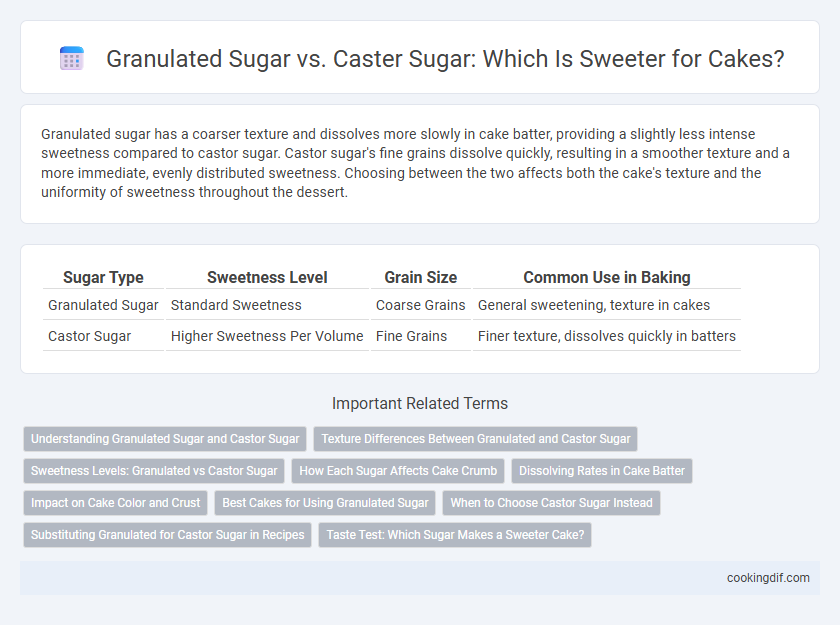Granulated sugar has a coarser texture and dissolves more slowly in cake batter, providing a slightly less intense sweetness compared to castor sugar. Castor sugar's fine grains dissolve quickly, resulting in a smoother texture and a more immediate, evenly distributed sweetness. Choosing between the two affects both the cake's texture and the uniformity of sweetness throughout the dessert.
Table of Comparison
| Sugar Type | Sweetness Level | Grain Size | Common Use in Baking |
|---|---|---|---|
| Granulated Sugar | Standard Sweetness | Coarse Grains | General sweetening, texture in cakes |
| Castor Sugar | Higher Sweetness Per Volume | Fine Grains | Finer texture, dissolves quickly in batters |
Understanding Granulated Sugar and Castor Sugar
Granulated sugar consists of larger crystals that dissolve more slowly, making it ideal for recipes requiring longer mixing or baking times, while castor sugar has finer crystals that dissolve quickly and provide a smoother texture in cakes and meringues. The sweetness level of both sugars is comparable, but castor sugar enhances the delicate crumb and tenderness of baked goods due to its rapid dissolution. Understanding the difference in crystal size and dissolution rates helps bakers choose the appropriate sugar for optimal sweetness and texture in cake recipes.
Texture Differences Between Granulated and Castor Sugar
Granulated sugar has larger crystals that dissolve more slowly in batter, resulting in a coarser texture in cakes, while castor sugar, with its finer grains, dissolves quickly to create a smoother, more delicate crumb. The finer texture of castor sugar helps incorporate air more efficiently during mixing, producing a lighter and fluffier cake. Using castor sugar enhances the cake's overall softness and tenderness compared to the slightly grittier texture from granulated sugar.
Sweetness Levels: Granulated vs Castor Sugar
Granulated sugar and castor sugar differ in sweetness intensity due to their crystal size, with castor sugar dissolving more quickly and providing a smoother, more evenly distributed sweetness in cakes. Castor sugar's finer grains enhance its ability to blend seamlessly into batter, yielding a more consistent texture and flavor profile compared to the coarser granulated sugar. This characteristic makes castor sugar a preferred choice in delicate cake recipes where precise sweetness levels and smoothness are essential.
How Each Sugar Affects Cake Crumb
Granulated sugar creates larger air pockets in cake batter, resulting in a coarser crumb with a more textured bite. Castor sugar, with its finer crystals, dissolves more quickly and evenly, producing a finer, more tender crumb with enhanced sweetness distribution. Choosing castor sugar helps achieve a delicate crumb structure while granulated sugar offers a denser texture and slightly less uniform sweetness.
Dissolving Rates in Cake Batter
Granulated sugar dissolves slower in cake batter compared to castor sugar, affecting the cake's texture and sweetness distribution. Castor sugar's finer crystals dissolve quickly, ensuring a smoother batter and more even sweetness throughout the cake. Using castor sugar enhances the cake's moisture retention and produces a tender crumb due to its rapid integration into the mixture.
Impact on Cake Color and Crust
Granulated sugar results in a coarser texture that promotes a darker, caramelized crust due to higher heat absorption during baking, enhancing the cake's color intensity. Castor sugar, with its finer granules, dissolves more quickly, producing a lighter crust and a more evenly colored cake surface. The choice between these sugars impacts both the sweetness distribution and the visual appeal of the cake's exterior.
Best Cakes for Using Granulated Sugar
Granulated sugar provides a coarser texture and slower dissolution, making it ideal for cakes like classic pound cakes and butter cakes where structure and crumb are important. Cakes baked with granulated sugar achieve a balanced sweetness and slightly crunchy crust, enhancing flavor complexity without over-sweetening. This sugar type works best in recipes requiring creaming with butter, producing tender yet firm cakes with well-defined crumb.
When to Choose Castor Sugar Instead
Castor sugar, with its finer granules, dissolves more quickly than granulated sugar, making it ideal for delicate cake batters and meringues where smooth texture is crucial. Choose castor sugar when baking sponge cakes or souffles to achieve a lighter crumb and enhanced sweetness distribution. In recipes requiring creaming butter and sugar, castor sugar ensures better aeration, resulting in a fluffier cake compared to granulated sugar.
Substituting Granulated for Castor Sugar in Recipes
Granulated sugar crystals are larger than castor sugar, which dissolves more quickly and creates a finer texture in cakes. When substituting granulated sugar for castor sugar, grinding granulated sugar slightly can help achieve similar sweetness and consistency without compromising the cake's crumb. Using granulated sugar directly may result in a coarser texture and slower dissolution, impacting the batter's smoothness and the final cake's tenderness.
Taste Test: Which Sugar Makes a Sweeter Cake?
Granulated sugar has larger crystals that dissolve more slowly, resulting in a slightly coarser texture and a less intense sweetness in cakes compared to castor sugar. Castor sugar's finer granules dissolve quickly, enhancing the cake's sweetness and creating a smoother crumb. Taste tests consistently show cakes made with castor sugar offer a more pronounced, evenly distributed sweetness than those made with granulated sugar.
Granulated sugar vs Castor sugar for sweetness Infographic

 cookingdif.com
cookingdif.com